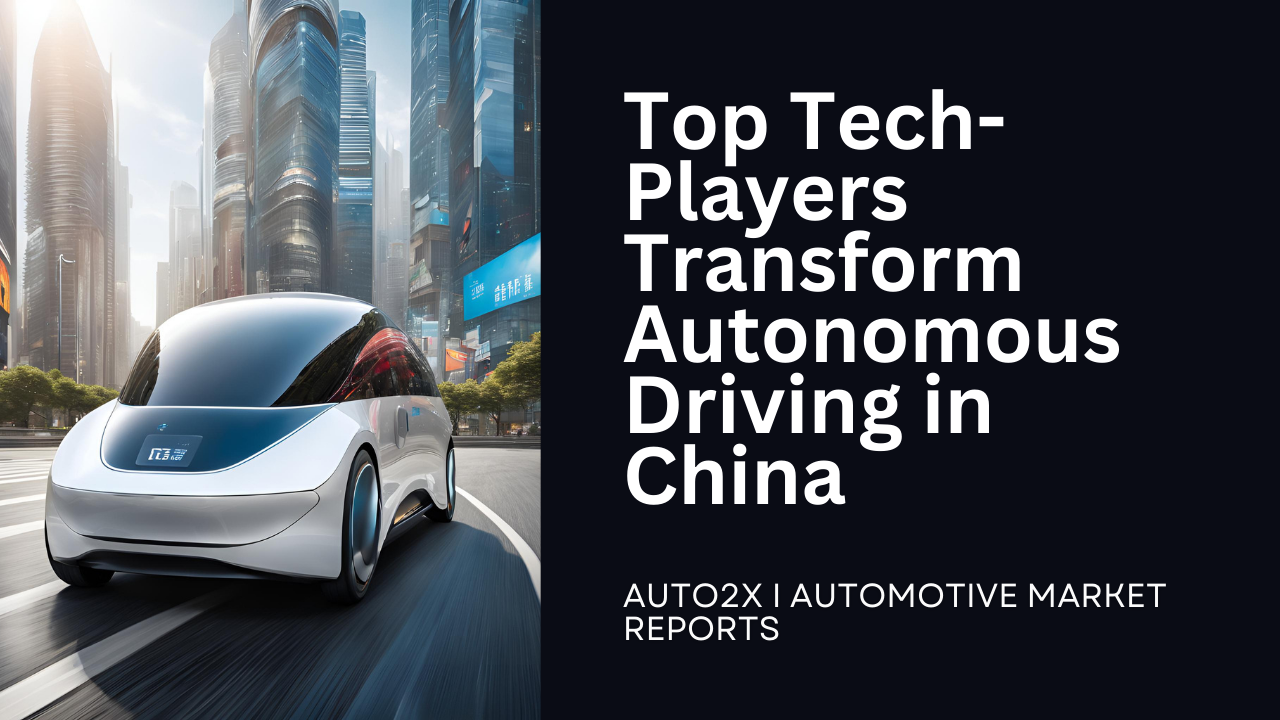China’s leading players in autonomous driving technologies, fueled by strong venture-capital investments and favourable government policies, aim to boost their technology (sensors, computing platforms, software, cloud system integration and mapping) in order to narrow the technological gap with their Western rivals.
Players like Alibaba, Baidu, DiDi, Tencent and Huawei have invested heavily in Autonomous Driving by participating in multiple funding rounds. What’s more, they have also established strategic cooperations with domestic carmakers, integrating their autonomous driving systems into production vehicles which could launch Level 3 faster than their European rivals.
This article summarizes the strategy of the Top-6 Chinese tech players in AD deployment incl. their key partnerships with Chinese carmakers that have taken place in 2020 and Q1 2021.
Alibaba Group
Alibaba-backed AutoX started its robotaxi operation in Shenzhen
Founded in 2016, AutoX has modified vehicles from various carmakers, including FCA Group and Dongfeng Motor, and conducted multiple road tests in Shenzhen, Beijing and Shanghai.
AutoX integrates Alibaba’s map product, Amap, into its robotaxi-hailing platform.
Alibaba-backed Xpeng’s beta version of Navigation Guided Pilot
In Jan 2021, Xpeng, a Chinese smart-EV company backed by Alibaba Group, successfully tested its NGP autonomous driving solution in Guangzhou highways.
According to the company’s announcement, the NGP function integrates XPeng’s XPILOT 3.0. The XPILOT 3.0 is an autonomous driving system that uses a combination of radar, cameras, high-precision maps powered by Alibaba, localization systems and, most recently, lidar to detect and predict road conditions and to accurately conduct navigation assisted driving.
Alibaba’s partnerships with SAIC
In November 2020, Alibaba and SAIC Group launched the high-end BEV car joint venture “Zhiji Motor”, which in early 2021 unveiled its 2 new models – under the “IM” brand. Powered by Nvidia system-on-a-chip (SoC) technology, the vehicles can realize Lv.2 autonomous driving and parking functions. The IM brand will compete in the premium smart EV market with BAIC’s Arcfox and Dongfeng’s Voyah brands.
Baidu’s key partnerships with Chinese automakers
Baidu launched its autonomous driving ecosystem, Baidu Apollo, back in 2017, aiming to establish itself as a world-class provider of AI and autonomous driving technologies.
In Dec.2020, Beijing authorities permitted Baidu to conduct fully driverless road tests on public streets; earlier this year the California Department of Motor Vehicles (DMV) has permitted Baidu to test 2 driverless vehicles – a Lincoln MKZ and a Chrysler Pacifica- on California’ roads. Baidu Apollo has built a fleet of more than 500 test vehicles; driving over 7 million kilometers in urban road testing worldwide.
Chery collaborates with Baidu Apollo in IOV and AD technologies:
Baidu’s Xiaodu in-car OS will expand from Chery’s premium brand Exeed to more Chery models; whereas the two companies will jointly cooperate in various fields like intelligent driving, IOV and the next-generation smart cockpit. Chery has been working with Baidu Apollo since 2018.
GAC Group joint hands with Baidu in the fields of automated driving, vehicle connectivity and digital marketing:
Under the agreement, the two companies will deepen their cooperation in the areas of autonomous driving, automated parking, digital marketing, intelligent shared mobility and intelligent connectivity.
Changan Auto and Baidu:
According to the agreement, Changan will enhance its ADiGO in-car smart ecosystem with Baidu’s expertise in IoV, big data, cloud computing and intelligent digital marketing solutions.
Baidu has also developed autonomous driving prototypes with BYD; and has established a strategic partnership with Great Wall Motors to jointly collaborate in the fields of IOV, autonomous driving and V2X technologies.
DiDi Chuxing
In early 2021, DiDi announced it has raised $300 million for its autonomous driving unit, marking the second time since early 2020, that Didi has tapped investors to enhance its technological capabilities in the autonomous driving field. In Jun.2020, Didi launched its pilot self-driving robotaxi service in Shanghai and announced plans to deploy more than 1 million self-driving vehicles through its ride-hailing platform by 2030. DiDi has recently agreed with Volvo to integrate its new self-driving hardware platform, DiDi Gemini, on XC90 vehicles
Collaboration with BYD in the shared mobility field
In 2020, Didi and BYD unveiled D1, an electric vehicle equipped with Lv.2 driving functions, developed exclusively for ride-hailing services. Back in 2019, the two firms established Meihao Chuxing Mobility, a joint venture in which BYD has the controlling interest.
GAC Aion teams up with ride-hailing Didi to jointly deploy full driverless NEVs in the shared mobility market: In May 2021, the two firms agreed to co-develop a driverless NEV model for large-scale shared mobility applications, through innovation in areas such as autonomous driving technologies and ICVs.
Cooperation in L4 R&D with BAIC: In Jun.2020, BAIC Group and DiDi announced that they will collaborate in R&D for Lv.4 features and future smart mobility services.
Horizon Robotics
Founded in 2015, Horizon Robotics develops AI semiconductors for MaaS, in-cabin applications and autonomous driving.
In Oct.2020, Horizon unveiled its new high-level driving semiconductor, the Journey3; a chip that supports a variety of application scenarios, such as high-level auxiliary driving, automatic parking assistance and high-precision map positioning. Horizon also plans to launch its Journey5 semiconductor for L3/L4 autonomous driving in 2021.
The company has established strategic partnerships with SAIC, GWM and GAC among others; until Jan.2021 Horizon has raised around $550 million in funding.
Collaboration with GWM to jointly explore intelligent technologies: The two parties aim to develop market-leading intelligent vehicle products, focusing on advanced driver-assistance systems, intelligent connectivity and other core technologies to accelerate R&D and mass production of intelligent vehicles.
Strategic partnership with SAIC: According to the strategic cooperation agreement, Horizon will provide SAIC next- generation passenger vehicles with a complete smart driving solution, based on the full range of Journey 2, Journey 3 and Journey 5 chips.
GAC Group investment in Horizon: GAC Capital invested in Horizon Robotics in Sept. 2020; earlier this year, GAC Capital and the GAC R&D Center forged a strategic partnership with Horizon, to jointly integrate Horizon’ Journey 3 artificial intelligence (AI) chip to GAC vehicles.
Huawei
In 2020, Huawei has established an alliance with 18 automakers, including FCA Group, Changan Auto, SAIC, Dongfeng Motor, GAC Group, BYD Auto, Great Wall Motors, Chery Holdings and JAC Motors, in an effort to establish a 5G- enabled automobile ecosystem.
In Dec.2020, GAC Aion, GAC Group’s new energy vehicle (NEV) platform, unveiled the Aion V all-electric SUV equipped with 5G and V2X modules powered by Huawei’s new-generation Balong 5000 5G chipset. In addition, earlier this year, BAIC Group and Huawei have launched ARCFOX Polar Fox Alpha S model, a new generation luxury pure electric vehicle with Lv.2 autonomous driving capabilities. Arcfox Alpha S, powered by Huawei’s Lidar technology, integrates 3 lidars with maximum detection distance up to 200 meters, 9 cameras, 12 ultrasonic sensors, 6 millimeter wave radars, 4 surround view cameras and Huawei ‘s SoC chipset.
According to recent media reports, Huawei plans to raise $1 billion in researching self-driving and EV technologies.
GAC Group works with Huawei to mass deploy Lv.4 autonomous vehicles by 2024: According to a Huawei’s announcement, the future-oriented Lv.4 automatic system jointly developed by the two firms, will be able to perform under several weather conditions and provide autonomous driving experience; although human control is required in specific scenarios. The two parties also plan to strengthen their cooperation in computing and communication architecture, in order to successfully upgrade GAC’s vehicles into really software-defined vehicles. Huawei and GAC have been cooperatively working since 2017; recently GAC Group has unveiled its new MPV series, the GAC Trumpchi M6 Pro, that is equipped with Huawei HiCar software technology.
Chery collaborates with Huawei to develop core ICT technologies: The two companies plan to build on the elevating consumption trend of future smart-mobility; and jointly develop the next-generation software-defined vehicles. According to the agreement, Chery and Huawei will collaborate in various intelligent fields, such as 5G-based applications, V2X communication and autonomous driving technologies.
BYD strengthened its cooperation with Huawei: Back in 2019, BYD and Huawei agreed to conduct in-depth exchanges and cooperation in the areas of automotive intelligent networking and intelligent driving. BYD and Huawei have jointly released a mobile NFC car key function; in 2020, BYD launched the electric sedan HAN, the first BYD ‘s vehicle equipped with Huawei’s 5G Hicar software embedded system.
Changan and Huawei collaborate in intelligent vehicle technologies, including Level-4 autopilot, 5G car networking, and C-V2X: Changan Automobile cooperates with Huawei on the “Beidou Tianshu Plan” aiming to create an intelligent network that will integrate intelligent driving, vehicle connectivity into Changan’s new-generation energy vehicles.
Huawei’s embedded technology on SAIC’s Marvel R: Roewe’s Marvel R, equipped with Huawei Balong 5000 5G chip and Mobileye EyeQ4H core chip, can realize 5G-V2X connectivity functions, as well as autonomous driving technologies; such as Lv.2 autonomous driving and fully-scene automated valet parking.
Tencent’s key partnerships with Chinese automakers
Tencent is a relative latecomer to the auto sector but is eager to capture potential revenue in providing cloud computing, AI applications and autonomous driving software.
In July 2020, Tencent released its new generation of autonomous driving simulation platform, the TAD Sim 2.0. It offers higher resolution in 3D scenario reconstruction and sensor simulation enabling autonomous driving testing in multiple diversified scenarios.
Tencent’s cloud and software applications are being used by several automakers and AV developers, including BMW and Geely; in addition, its smart infotainment applications are being used by Hyundai, GAC and Changan.
Changan launched Tencent’s “in-car WeChat” on CS 75 Plus
Aiming to reduce the safety hazard associated with using smartphones and social media applications while driving, the enhanced voice-operated version of Tencent’s “WeChat” feature supports a full-voice interaction function, to enable drivers to safely use the app while they drive. The voice-operated version of “WeChat”is currently available, among others, in CS 75 Plus, CS 85 Coupe and UNI-T. Changan also integrates the networked operating system Tinove OS, developed by Wutong Auto, to further enhance the in-car smart connectivity ecosystem of its vehicles.
Collaboration with Geely
In 2019, ECARX, a strategically invested enterprise under Geely Holding Group, signed a cooperative agreement with Tencent Auto to work together on intelligent connectivity services, joint user operations, AI, and cloud services. Currently, Tencent automotive applications have been successfully integrated into several Geely models.
Tencent Intelligent Networking GT2.0 system on GAC’s Trumpchi GS
GAC’s flagship SUV is equipped with the new GAC Tencent Intelligent Networking GT2.0 system that provides intelligent voice control, WeChat social in-vehicle platform, Beidou/GPS dual-mode 3D voice navigation system and Guang Xiaoqi’s that enables voice assistant in basic vehicle functions such as seat heating, air conditioning, sunroof, windows, infotainment etc..
Read More
To learn about Carmakers’ strategies, market positioning and leadership in MaaS read our report “Carmakers’ Competitiveness in Smart Mobility“.
To learn more about competition and market developments in the next decade read our reports
- 30 Carmakers’ Roadmaps in Automated Driving up to 2025.
- ADAS Suppliers Rankings & market shares 2015-20

